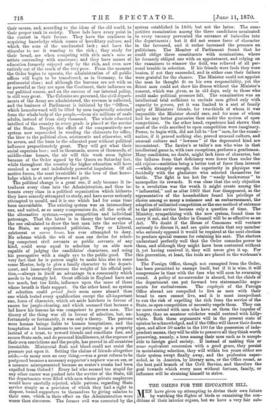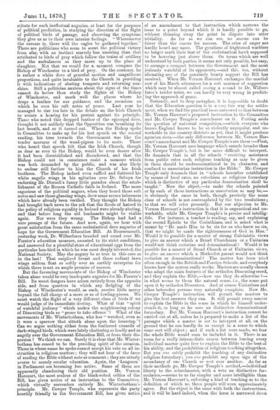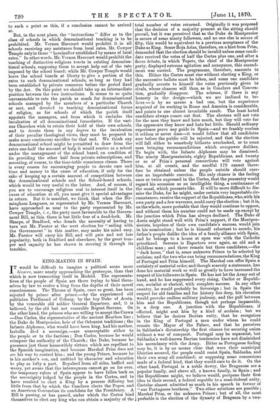THE OMENS FOR THE EDUCATION BILL.
have given up attempting to divine their own future by watching the flights of birds or examining the con- ditions of their interior organs, but we have a very fair sub- stitute for such ineffectual auguries, at least for the purposes of political prediction, in studying the direction of the flight of political birds of passage, and observing the symptoms they give us as to their own interior feelings. " Wheresoever the carcase is, there will the eagles be gathered together."
There are politicians who seem to scent the political victory from afar, with an instinct scarcely less unerring than that attributed to birds of prey which follow the trains of artillery and the ambulances as they move up to the place of slaughter. Not that we would for a moment compare the Bishop of Winchester to a bird of prey. On the contrary, he is rather a white dove of graceful motion and magnificent proportions, and quite invaluable to the Church in providing it with indications of abating tempests and returning sun- shine. Still a politician anxious about the signs of the times cannot do better than study the flights of the Bishop of Winchester, and mark well the places where he drops a feather for our guidance, and the occasions on which he coos his soft notes of peace. Last year he managed to rise too late in the debate on the Irish Church to secure a hearing for his protest against its principle. Those who noted this dropped feather of the episcopal dove, thought it not unlikely that the Opposition was breathing its last breath, and so it turned out. When the Bishop spoke in Committee to make up for his lost speech on the second reading, his tune towards the Government was like the tender murmur of the wood-pigeon to its mate. Those who heard that speech felt that the Irish Church, though as dear as ever to the Bishop, would be even dearer after it had been disestablished and disendowed, and that the Bishop could not in conscience resist a measure which was both demanded by the public, and was also likely to endear still further to him the Church of his Irish brethren. The Bishop indeed even ruffled and fluttered his white angelic wings in his agitation over Dr. Selwyn for endorsing Mr. Disraeli's funny little paradox about the estab- lishment of the Roman Catholic faith in Ireland. The more sagacious of the political augurs, when they heard those soft notes and saw those glancing wings, drew some secure inferences which have already been verified. They thought the Bishop had brought back news to the ark that the floods of hatred to the policy of religious equality in Ireland were already abating, and that before long the old landmarks might be visible again. Nor were they wrong. The Bishop had had a sure presage of the future. And now, again, we hear with great satisfaction from the same ecclesiastical dove auguries of hope for the Government Education Bill. At Bournemouth, yesterday week, Dr. Wilberforce brooded and cooed over Mr. Forster's education measure, assented to its strict conditions, and answered for a plentiful store of educational eggs from the particular hen-bird in which he was most deeply interested, the National Society. May the augury be as true in this case as in the last! That surpliced breast and those radiant lawn wings seldom float so softly over an earthly enterprize for which there is not an ample promise of success.
But the favouring movements of the Bishop of Winchester taken alone would be very inadequate auguries for Mr. Forster's Bill. Its worst dangers have arisen entirely from the opposite side, and from quarters in which any fledgling of the Bishop of Winchester's would, as such, receive little mercy beyond the full charge of a score or so of fowling-pieces. We must watch the flight of a very different class of birds if we would judge of its immediate destiny. What of that " spirit of watchful jealousy " which makes the neighbouring colony of Dissenting birds so "prone to take offence "? What of the movements of Mr. Winterbotham, who has " watched, even as it were a sparrow that sitteth alone upon the housetop "? Can we argue nothing either from the feathered councils of dark-winged birds, which were lately chattering so loudly and so angrily over the Government Education Bill, or from their dis- persion ? We think we can. Surely it is clear that Mr. Winter- botham has ceased to be the presiding spirit of the occasion. Those in whose name he spoke cannot accept his veto on all in- struction in religious matters ; they will not hear of the farce of reading the Bible without note or comment ; they are utterly averse to merely secular education. Again, the 'Leaguers ' in Parliament are becoming less active. Some of them are apparently abandoning their old position. Mr. Vernon Harcourt, the most zealous of the black-robed critics of the Bill, has given notice of an instruction to the Committee, which virtually surrenders entirely Mr. Winterbotham's principle. Mr. Cowper Temple, who represents the party heartily friendly to the Government Bill, has given notice of an amendment to that instruction which narrows the issue to a point beyond which it is hardly possible to go, without thinning away the point in dispute into utter triviality. As far as we can see, no omens can be fairer than the omens for success. The cries of anger are hardly heard any more. The gyrations of frightened warblers no longer mark their fear of the ecclesiastical hawk supposed to be hovering just above them. On terms which are well understood by both parties, it seems not only possible, but easy, to arrange a compact between the Government and the most jealously watchful of its opponents,—and this, too, without alienating any of the genuinely hearty support the Bill has received. When Mr. Vernon Harcourt exchanges the martial caw of his March utterances for a soft murmur of suggestion which may be almost called cooing a second to Dr. Wilber- force's tender notes, we can hardly be very wrong in predict- ing the approach of peace.
Seriously, and to drop metaphor, it is impossible to doubt that the Education question is in a very fair way for settle- ment, when we find the practical issue narrowed to that between Mr. Vernon Harcourt's proposed instruction to the Committee and Mr. Cowper Temple's amendment on it. Putting aside the question of universal compulsion,—which everyone who knows England knows to be so violently unpopular, and un- workable in the country districts as yet, that it might produce agrarian riots,—the only difference between Mr. Vernon Har- court's amendment and Mr. Cowper Temple's are these :—First, Mr. Vernon Harcourt uses language which sounds broader than Mr. Cowper Temple's, but is far more difficult to interpret. He demands that in all the schools " receiving assistance from public rates such religious teaching as may be given in them should be =denominational in its character, and confined to unsectarian instruction in the Bible." Mr. Cowper Temple only demands that in " schools hereafter established by means of local rates, no catechism or religious formulary which is distinctive of any particular denomination shall be taught." Now the object,—to make the schools pointed at by each of these instructions as unsectarian as may be,— is obviously the same in both, though precisely the same class of schools is not contemplated by the two resolutions ; to that we will refer presently. But our objection to Mr. Vernon Harcourt's instruction is that it is unpractical and un- workable, while Mr. Cowper Temple's is precise and intellig- ible. For instance, a teacher is reading, say, and explaining the second Epistle to the Corinthians, and is asked what is meant by " He made Him to be sin for us who knew no sin, that we might be made the righteousness of God in Him." Would it be possible for a master of strong Calvinistic views to give an answer which a Broad Churchman or a Unitarian would not think sectarian and denominational ? Would it be possible for a master of Broad Church or of Unitarian views, to give an answer which a Methodist parent would not think sectarian or denominational ? The matter has been tried often enough in the British and Foreign Schools, and everybody knows how the system really works. Masters are usually chosen who adopt the main features of the orthodox Dissenting creed, and they explain the Bible,—how can they do otherwise ?- in what seems to them the natural sense, i.e., the sense put upon it by orthodox Dissenters. And of course Unitarians and other heterodox persons very naturally complain. Now Mr.
Cowper Temple's instruction will permit the masters to give the best answers they can. It will permit every master to explain the Bible in the sense in which ho himself under- stands it, so long as he uses no distinctive denominational formulary. But Mr. Vernon Harcourt's instruction cannot be carried out at all, unless he is prepared to make a list of the passages which a master is not to interpret at all, on the ground that he can hardly do so except in a sense to which some sect will object ; and if such a list were made, we fear the whole Bible would soon be included in it. There is no room for a really intermediate course between leaving every individual master quite free to explain the Bible to the best of his ability, and the prohibition of religious teaching altogether.
But you can safely prohibit the teaching of any distinctive religious formulary ; you can prohibit any open sign of the ascendancy of one Church or sect over another. As far as their methods go, Mr. Cowper Temple's method,—individual liberty to the schoolmaster, with a veto on distinctive for- mularies,—seems to us far simpler and more intelligible than Mr. Vernon Harcourt's, enforcing a kind of teaching as to the definition of which no three people will even approximately agree. But the object is the same with both the instructions, and it will be hard indeed, when the issue is narrowed down to such a point as this, if a conclusion cannot be arrived at.
But, in the next place, the "instructions " differ as to the class of schools in which denominational teaching is to be prohibited. Mr. Vernon Harcourt would prohibit it in all schools receiving any assistance from local rates, Mr. Cowper Temple only in those " hereinafter established by means of local rates." In other words, Mr. Vernon Harcourt would prohibit the teaching of distinctive religious tenets in existing denomina- tional schools, supposing them to accept help out of the rate imposed by the school board; while Mr. Cowper Temple would leave the school boards at liberty to give a portion of the rates to such denominational schools, so long as they had been established by private resources before the period fixed by the Act. On this point we should take up an intermediate position between the two instructions. It seems to us quite unreasonable to rate the parish as much for denominational schools managed by the members of a particular Church or sect, and devoted to teaching denominational forms of religion, as for schools of which the parish itself appoints the managers, and from which it excludes the inculcation of all denominational formularies. If the vari- ous Churches wish to retain their hold of their own schools, and to devote them in any degree to the inculcation of their peculiar theological views, they must be prepared to make some continuous sacrifice for that end. We think any denominational school might be permitted to draw from the rates one-half the amount of help it would receive as a school under the management of the school board, on condition of its providing the other half from private subscriptions, and assenting, of course, to the time-table conscience clause. There is every reason for encouraging people to devote care and time and money to the cause of education, if only for the sake of keeping up a certain amount of competition between the denominational schools and the School-board schools, which would be very useful to the latter. And, of course, if you are to encourage religions zeal to interest itself in the cause of education at all, you must give it special advantages in return. But it is manifest, we think, that when the Bir- mingham Leaguers, as represented by Mr. Vernon Harcourt, have approached as near to the party represented by Mr. Cowper Temple, i. e., the party most favourable to the Govern- ment Bill, as this, there is but little fear of a dead-lock. Mr. Sharpe, of Bradford, who dreads the necessity of having to turn out Mr. Forster at the next election for " sailing with the Government " in this matter, may make his mind easy. Mr. Forster will carry his Bill, and will gain and not lose popularity, both in Bradford and elsewhere, by the great tem- per and sagacity he has shown in steering it through its troubles.
































 Previous page
Previous page